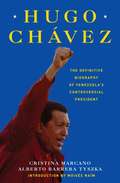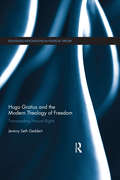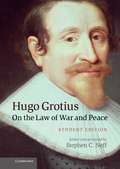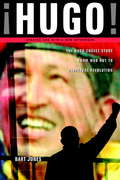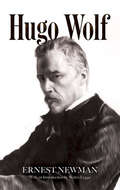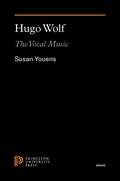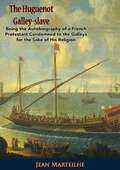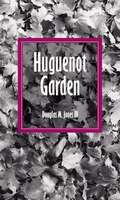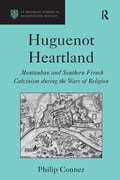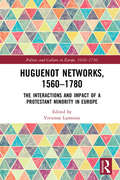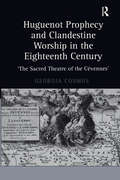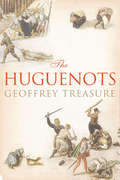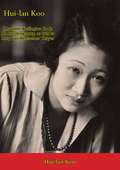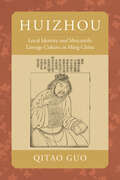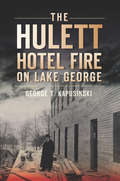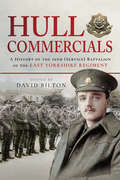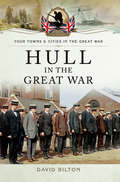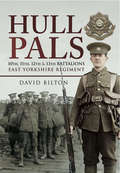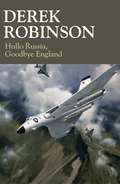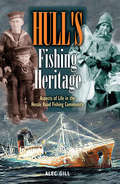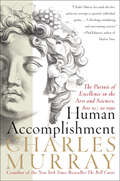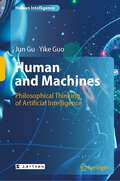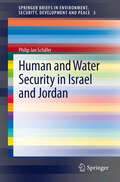- Table View
- List View
Hugo Chávez
by Cristina Marcano Alberto Barrera TyszkaHe is one of the most controversial and important world leaders currently in power. In this international bestseller, at last available in English, Hugo Chávez is captured in a critically acclaimed biography, a riveting account of the Venezuelan president who continues to influence, fascinate, and antagonize America. Born in a small town on the Venezuelan plains, Chávez found his interests radically altered when he entered the military academy in Caracas...
Hugo Grotius and the Modern Theology of Freedom: Transcending Natural Rights (Routledge Innovations in Political Theory)
by Jeremy Seth GeddertHuman rights are thought to guarantee pluralism by protecting individual liberty from imposed religious conceptions of virtue. Yet critics often argue that this secular focus on merely avoiding violations can also enable unfettered individualism and undermine appeals to the common good. This book uncovers in secular rights pioneer Hugo Grotius a rights theory that points toward the enlargement of individual responsibility. It grounds this connection in Grotius’ unexplored theological corpus, which reveals a dual metaethics and jurisprudence. Here a deontological natural law undergirds a secular theory of rights that is self-aware of its own limitations. A teleological practical reason then guides the exercise of these rights, so as not to compromise the political order that defends them. The book then illustrates this symbiosis of rights and responsibilities in five areas: consent theories of government, rights of rebellion, criminal punishment, war and international responsibility, and Atonement theology. This reassesses Grotius’ legacy as a secularist opponent of classical political thought, and suggests that modern liberalism and universal human rights are compatible with a world of resurgent religion.
Hugo Grotius on the Law of War and Peace
by Stephen C. NeffDespite its significant influence on international law, international relations, natural law and political thought in general, Grotius's Law of War and Peace has been virtually unavailable for many decades. Stephen Neff's edited and annotated version of the text rectifies this situation. Containing the substantive portion of the classic text, but shorn of extraneous material, this edited and annotated edition of one of the classic works of Western legal and political thought is intended for students and teachers in four primary areas: history of international law, history of political thought, history of international relations and history of philosophy.
Hugo! The Hugo Chàvez Story from Mud Hut to Perpetual Revolution
by Bart JonesRuling elites in Venezuela, the United States and Europe, and even Hugo Chávez himself though for different reasons, have been eager to have the world view him as the heir to Fidel Castro. But the truth about this increasingly influential world leader is more complex, and more interesting.. The Chávez that emerges from Bart Jones' carefully researched and documented biography is neither a plaster saint nor a revolutionary tyrant. He has an undeniably autocratic streak, and yet has been freely and fairly re-elected to his nations presidency three times with astonishing margins of victory. He is a master politician and an inspired improviser, a Bolivarian nationalist and an unashamed socialist. His policies have brought him into conflict with the International Monetary Fund, the World Bank, and major oil companies. They have also provided a model for new governments and social movements in Ecuador, Bolivia, and Argentina. When in September 2006 he declared at the United Nations that 'the devil came here yesterday ... the President of the United States', it was clear that he was taking on challenging the most powerful nation on earth, in conscious imitation of the Liberator, Simon Bolivar.From the Trade Paperback edition.
Hugo Wolf (Dover Books On Music: Composers)
by Ernest Newman Walter Legge Prof. Roelof OostwoudHailed as "very interesting and very stimulating" by The New York Times, this critical biography explores the life and music ofa supreme master of German song. Austrian composer Hugo Wolf (1860-1903) wrote hundreds of lieder despite the often-overwhelming effects of depression. This two-part volume contains both a biographical narrative and a sensitive survey of the composer's unique contributions to songwriting.Beginning with Wolf's early struggles with academic failures and poverty, the book traces his brief and controversial career as a Viennese music critic, outlining the alternate periods of productivity and paralysis that led to his final mental collapse and untimely death. Author Ernest Newman writes with exuberance and keen perception of Wolf's flowering as a composer and the birth of his song cycles -- the Keller songs, the Spanish, Mörike, Goethe, and Eichendorff volumes -- in addition to critiquing a variety of other choral and instrumental works. Music lovers of all ages will appreciate this guide to an extraordinary composer's life and works.
Hugo Wolf: The Vocal Music
by Susan YouensA groundbreaking look at one of the great song composers of the late Romantic periodIn the virtual cottage industry of works on fin de siècle Vienna, Hugo Wolf (1860–1903) has been somewhat neglected, perhaps because he was the master of a small genre—the late Romantic lied—and never truly made his mark in the larger forms that command greater public attention. But in the realm of song, he is among the greatest inheritors of Schubert and Schumann, one who was both a traditionalist and a modernist. When the Viennese critic Eduard Hanslick disapprovingly dubbed Wolf &“the Richard Wagner of the lied,&” he was paying oblique homage to Wolf&’s genius as a song composer in the most modern manner.In this book, Susan Youens examines five aspects of Wolf&’s compositional art, each exemplifying a different synthesis of traditionalism and modernity and spanning his entire, tragically brief creative life, from his first efforts to his lapse into insanity in 1897. She discusses Wolf&’s youthful imitations of Schumann, his genius for comic songs of a kind unlike any of his predecessors, his part in the ballad revival of the late nineteenth century, Wolf in relation to his contemporaries, and his pursuit of operatic fame. Youens looks as closely at the poetic texts as she does the music and includes numerous previously unpublished sketches and fragments, examples from songs now long out of print and difficult to obtain, and citations from Wolf&’s vivid letters and other sources of the period.
The Huguenot Galley-slave: Being the Autobiography of a French Protestant Condemned to the Galleys for the Sake of His Religion
by Jean MarteilheThis is the memoir of a French Huguenot who tried to escape from France to a more sympathetic Protestant country after the revocation of the Edict of Nantes in 1685. Marteilhe was condemned to the French Mediterranean Galleys for his religion. Believed to be the only authentic record of the miseries of being a galley slave in the eighteenth century.
Huguenot Garden
by Douglas M. JonesSupported by the beliefs of their faith, twins Renee and Albret and the rest of the Martineau family stand fast during the persecution of the French Huguenots by King Louis XIV and the Roman Church in 1685.
Huguenot Heartland: Montauban and Southern French Calvinism During the Wars of Religion (St Andrews Studies in Reformation History)
by Philip ConnerIn the immediate years and months before the outbreak of religious war in 1562 the growth of Protestantism in France had gone unchecked, and an overriding sense of Protestant triumphalism emerged in cities across the land. However, the wars unleashed a vigorous Catholic reaction that extinguished Protestant hopes of ultimate success. This offensive triggered violence across the provinces, paralysing Huguenot communities and sending many Protestant churches in northern France into terminal decline. But French Protestantism was never a uniform phenomenon and events in southern France took a rather different course from those in the north. This study explores the fate of the Huguenot community in the area of its greatest strength in southern France. The book examines the Protestant ascendancy in the Huguenot stronghold of Montauban through the period of the religious wars, laying open the impact that the new religion had upon the town and its surrounding locality, and the way in which the town related to the wider political and religious concerns of the Protestant south. In particular, it probes the way in which the town related to the nobility, the political assemblies, Henry of Navarre and the wider world of international Calvinism, reflecting upon the distinctive cultural elements that characterised Calvinism in southern France.
Huguenot Networks, 1560–1780: The Interactions and Impact of a Protestant Minority in Europe (Politics and Culture in Europe, 1650-1750)
by Vivienne LarminieThese chapters explore how a religious minority not only gained a toehold in countries of exile, but also wove itself into their political, social, and religious fabric. The way for the refugees’ departure from France was prepared through correspondence and the cultivation of commercial, military, scholarly and familial ties. On arrival at their destinations immigrants exploited contacts made by compatriots and co-religionists who had preceded them to find employment. London, a hub for the “Protestant international” from the reign of Elizabeth I, provided openings for tutors and journalists. Huguenot financial skills were at the heart of the early Bank of England; Huguenot reporting disseminated unprecedented information on the workings of the Westminster Parliament; Huguenot networks became entwined with English political factions. Webs of connection were transplanted and reconfigured in Ireland. With their education and international contacts, refugees were indispensable as diplomats to Protestant rulers in northern Europe. They operated monetary transfers across borders and as fund-raisers, helped alleviate the plight of persecuted co-religionists. Meanwhile, French ministers in London attempted to hold together an exceptionally large community of incomers against heresy and the temptations of assimilation. This is a story of refugee networks perpetuated, but also interpenetrated and remade.
Huguenot Prophecy and Clandestine Worship in the Eighteenth Century: 'The Sacred Theatre of the Cévennes'
by Georgia CosmosFollowing Louis XIV's revocation of the Edict of Nantes in 1685, French protestants faced the stark choice of abandoning their religion, or defying the law. Many fled abroad, whilst others continued to meet clandestinely for worship and to organise resistance to government policy, culminating in the bloody Camisard rebellion of 1702-10. During this period of conflict and repression, a distinct culture of prophecy and divine inspiration grew up, which was to become a defining characteristic of the dispersed protestant communities in southern France. Drawing on a wide range of printed and manuscript material, this study, examines the nature of Huguenot prophesying in the Cévennes during the early years of the eighteenth century. As well as looking at events in France, the book also explores the reactions of the Huguenot community of London, which became caught up in the prophesying controversy with the publication in 1707 of Le Théatre sacré des Cévennes. This book, which recounted the stories of exiles who had witnessed prophesying and miraculous events in the Cévennes, not only provided a first hand account of an outlawed religion, but became the centre of a heated debate in London concerning 'false-prophets'. By exploring French protestantism through voluntary testimonies given by Huguenot exiles in London, this study not only offers a rare glimpse of a forbidden religion, but also shows how a long-established immigrant church in London confronted the problems posed by recent arrivals infused with a radical sense of mystic purpose and divine revelation.
The Huguenots
by Geoffrey TreasureFrom the author of Louis XIV, an unprecedented history of the entire Huguenot experience in France, from hopeful beginnings to tragic diaspora. Following the Reformation, a growing number of radical Protestants came together to live and worship in Catholic France. These Huguenots survived persecution and armed conflict to win—however briefly—freedom of worship, civil rights, and unique status as a protected minority. But in 1685, the Revocation of the Edict of Nantes abolished all Huguenot rights, and more than 200,000 of the radical Calvinists were forced to flee across Europe, some even farther. In this capstone work, Geoffrey Treasure tells the full story of the Huguenots&’ rise, survival, and fall in France over the course of a century and a half. He explores what it was like to be a Huguenot living in a &“state within a state,&” weaving stories of ordinary citizens together with those of statesmen, feudal magnates, leaders of the Catholic revival, Henry of Navarre, Catherine de&’ Medici, Louis XIV, and many others. Treasure describes the Huguenots&’ disciplined community, their faith and courage, their rich achievements, and their unique place within Protestantism and European history. The Huguenot exodus represented a crucial turning point in European history, Treasure contends, and he addresses the significance of the Huguenot story—the story of a minority group with the power to resist and endure in one of early modern Europe&’s strongest nations. &“A formidable work, covering complex, fascinating, horrifying and often paradoxical events over a period of more than 200 years…Treasure&’s work is a monument to the courage and heroism of the Huguenots.&”—Piers Paul Read, The Tablet
The Huguenots of Paris and the Coming of Religious Freedom, 1685-1789
by David GarriochHow did the Huguenots of Paris survive, and even prosper, in the eighteenth century when the majority Catholic population was notorious for its hostility to Protestantism? Why, by the end of the Old Regime, did public opinion overwhelmingly favour giving Huguenots greater rights? This study of the growth of religious toleration in Paris traces the specific history of the Huguenots after Louis XIV revoked the Edict of Nantes in 1685. David Garrioch identifies the roots of this transformation of attitudes towards the minority Huguenot population in their own methods of resistance to persecution and pragmatic government responses to it, as well as in the particular environment of Paris. Above all, this book identifies the extraordinary shift in Catholic religious culture that took place over the century as a significant cause of change, set against the backdrop of cultural and intellectual transformation that we call the Enlightenment.
Hui-lan Koo [Madame Wellington Koo]: An Autobiography, as Told to Mary Van Rensselaer Thayer
by Hui-Lan KooThis is a colourful 1943 autobiography of Hui-lan Koo, known as Madame Wellington Koo, the then-wife of the famous Chinese diplomat Vi Kyuin Wellington Koo (1888-1985).Hui-lan Koo presents her China from a new angle, never mentioning floods, famines, or starving coolies. She is concerned chiefly with the fortunate few who played important roles in contemporary Chinese history. As leading lady of an uneasy age, she knew them all intimately; she speaks of them casually, these Chinese who possessed palaces, priceless jades, and beautiful concubines.This is the life of a Chinese lady, a noted beauty, born to fabulous wealth. She is the wife of Wellington Koo, China’s most brilliant diplomat, later Ambassador to Great Britain. Madame Koo’s life, both in Europe and the Orient, has been packed with excitement. She has presided over embassies in Paris, London and Washington. An irrepressible lady, the impressions make revealing reading.
Huizhou: Local Identity and Mercantile Lineage Culture in Ming China
by Prof. Qitao GuoA free open access ebook is available upon publication. Learn more at www.luminosoa.org.Huizhou studies the construction of local identity through kinship in the prefecture of Huizhou, the most prominent merchant stronghold of Ming China. Employing an array of untapped genealogies and other sources, Qitao Guo explores how developments in the sociocultural, religious, and gender realms from the fifteenth to sixteenth centuries intertwined to shape Huizhou identity as a land of "prominent lineages." This gentrified self-image both sheltered and guided the development of mercantile lineages, which were further bolstered by the gender regime and the local religious order. As Guo demonstrates, the discrepancy between representation and practice helps explain Huizhou's triumphs. The more active the economy became, the more those central to its commercialization embraced conservative sociocultural norms. Home lineages embraced neo-Confucian orthodoxy even as they provided the financial and logistical support to assure the success of Huizhou merchants. The end result was not "capitalism" but a gentrified mercantile lineage culture with Chinese—or Huizhou—characteristics.
Hulett Hotel Fire on Lake George, The
by George T. KapusinskiFew resorts could have boasted the kind of history that the Huletts Hotel had. Built in Huletts Landing, NY, on Lake George, the first hotel burned in 1915, and this arson was the subject of a sensational Upstate New York trial. Capitalizing on the notoriety that this trial created, the Eichler family rebuilt, only to again lose the hotel, this time it in a scandalous tax dispute in 1958. This book is about the burning of the first hotel, ensuing arson trials, rebuilding, the glory days of Huletts (when people like Amelia Earhart and Kennedy family members were frequent visitors), and the untimely closing of the second hotel. A second mystery surrounds 20 photographs of the original hotel taken in 1916, which were recently uncovered taped to the back of a painting of Abraham Lincoln. Kapusinski will use that story to unravel the other mysteries surrounding this lost hotel.
Hull Commercials: A History of the 10th (Service) Battalion of the East Yorkshire Regiment
by David BiltonIn the 1930s five men wrote a history of the battalion they had proudly served with: the 1st Hull Battalion, known today as the 10th East Yorkshire Regiment or The Commercials. The book is the story of a happy family, men drawn together to fight for justice. There is no attempt to look at the bigger picture, and no attempt is made to comment on tactics or strategy; it is simply the story of a group of men and their travels across England, Egypt and the Western Front and what they achieved. Their love for their fellow soldiers and the battalion being clearly shown in early 1918 when the original members were all asked if they would like to train to become officers: the vast majority refused, preferring to stay in the ranks with their friends.The story is carefully crafted and based upon personal diaries, now long gone, and conversations between the participants. As well as the story of the battalions travels the appendices list awards, a diary of movement and a roll of honor. The editor, known for his work on the Hull Pals has added a complete listing of the original battalion, extra photographs, previously unpublished, and relevant footnotes.This book is the third book in the 1st Hull Pals trilogy and is essential reading for all interested in the Pals Battalions, providing a clear and concise record of a typical battalion at war.
Hull in the Great War (Your Towns & Cities in the Great War)
by David BiltonThe outbreak of war in 1914 aroused an enthusiasm in Hull and within the first six months 20,000 local men had enrolled. Hull was also attacked by Zeppelins and it raised its own Pals Battalions. This book looks at how the experience of war impacted on the City, from the initial enthusiasm for sorting out the German Kaiser in time for Christmas 1914, to the gradual realization of the enormity of human sacrifice the families of Hull were committed to as the war stretched out over the next four years. The Great War affected everyone. At home there were wounded soldiers in military hospitals, refugees from Belgium and later on German prisoners of war. There were food and fuel shortages and disruption to schooling. The role of women changed dramatically and they undertook a variety of work undreamed of in peacetime. Meanwhile, men serving in the armed forces were scattered far and wide. Extracts from contemporary letters reveal their heroism and give insights into what it was like under battle conditions.As featured in the Hull Daily Mail.
Hull Pals: 10th, 11th, 12th and 13th Battalions East Yorkshire Regiment (Pals Ser.)
by David BiltonIn response to Kitchener's famous call for a million volunteers, local communities raised entire battalions for the service on the Western Front. Hull folk are reticent people and the Hull Pals were no exception. This book tells their inspiring story of sacrifice and gallantry under appaling conditions. Hull Pals contains a great number of hitherto unpublished eye-witnessed accounts and photographs.As featured on BBC Radio Humberside and in The Yorkshire Post.
Hullo Russia, Goodbye England
by Derek RobinsonFlight Lieutenant Silk, a twice-decorated Lancaster pilot in WW II, rejoins the R.A.F. and qualifies to fly the Vulcan bomber. Piloting a Vulcan is an unforgettable experience: no other aircraft comes close to matching its all-round performance. And as bombers go, it's drop-dead gorgeous. But there's a catch. The Vulcan has only one role: to make a second strike. To act in retaliation for a Russian nuclear attack. Silk knows that knows that if he ever flies his Vulcan in anger, he'll be flying from a smoking wasteland, a Britain obliterated. But in the mad world of Mutually Assured Destruction, the Vulcan is the last - the only - deterrent. Derek Robinson returns with another rip-roaring, gung-ho R.A.F. adventure, one that exposes and confronts the brinkmanship and sabre-rattling of the Cold War Era.
Hullo Russia, Goodbye England
by Derek RobinsonFlight Lieutenant Silk, a twice-decorated Lancaster pilot in WW II, rejoins the R.A.F. and qualifies to fly the Vulcan bomber. Piloting a Vulcan is an unforgettable experience: no other aircraft comes close to matching its all-round performance. And as bombers go, it's drop-dead gorgeous. But there's a catch. The Vulcan has only one role: to make a second strike. To act in retaliation for a Russian nuclear attack. Silk knows that knows that if he ever flies his Vulcan in anger, he'll be flying from a smoking wasteland, a Britain obliterated. But in the mad world of Mutually Assured Destruction, the Vulcan is the last - the only - deterrent. Derek Robinson returns with another rip-roaring, gung-ho R.A.F. adventure, one that exposes and confronts the brinkmanship and sabre-rattling of the Cold War Era.
Hull's Fishing Heritage: Aspects of Life in the Hessle Road Fishing Community
by Alec GillTrue stories of an English fishing community and its families, from street games and superstitions to the dangers of shipwrecks and war—includes photos. Survivors of a wrecked trawler stagger ashore in Iceland during the bitter winter of 1910 in a hair-raising tale based upon Skipper Brewer&’s handwritten log. Another skipper, &“Mad&” Rilatt, outwits German U-boats in the First World War. A suicide mission to war-torn Norway is undertaken in 1940 aboard a former Hull trawler. Amy Johnston, who flew to Australia single-handed, is revealed as a Hessle Road girl. And &“Cowboys of the Arctic Circle&” shows how Hollywood influenced the young trawler lads. The fishing community of Hessle Road in Hull represents a unique breed of people who endured hardship from the elements in times of peace—and danger from the enemy in times of war. Within the world of the fishing families of Hull is a whole universe of humanity. Based upon interviews and three decades of research, a range of colorful tales are presented in Hull&’s Fishing Heritage.
Human Accomplishment: The Pursuit of Excellence in the Arts and Sciences, 800 B.C. to 1950
by Charles MurrayA sweeping cultural survey reminiscent of Barzun's From Dawn to Decadence."At irregular times and in scattered settings, human beings have achieved great things. Human Accomplishment is about those great things, falling in the domains known as the arts and sciences, and the people who did them.' So begins Charles Murray's unique account of human excellence, from the age of Homer to our own time. Employing techniques that historians have developed over the last century but that have rarely been applied to books written for the general public, Murray compiles inventories of the people who have been essential to the stories of literature, music, art, philosophy, and the sciences—a total of 4,002 men and women from around the world, ranked according to their eminence.The heart of Human Accomplishment is a series of enthralling descriptive chapters: on the giants in the arts and what sets them apart from the merely great; on the differences between great achievement in the arts and in the sciences; on the meta-inventions, 14 crucial leaps in human capacity to create great art and science; and on the patterns and trajectories of accomplishment across time and geography. Straightforwardly and undogmatically, Charles Murray takes on some controversial questions. Why has accomplishment been so concentrated in Europe? Among men? Since 1400? He presents evidence that the rate of great accomplishment has been declining in the last century, asks what it means, and offers a rich framework for thinking about the conditions under which the human spirit has expressed itself most gloriously. Eye-opening and humbling, Human Accomplishment is a fascinating work that describes what humans at their best can achieve, provides tools for exploring its wellsprings, and celebrates the continuing common quest of humans everywhere to discover truths, create beauty, and apprehend the good.
Human and Machines: Philosophical Thinking of Artificial Intelligence (Human Intelligence)
by Jun Gu Yike GuoThis book shares Chinese scholars’ philosophical views on artificial intelligence. The discussions range from the foundations of AI—the Turing test and creation of machine intelligence—to recent applications of AI, including decisions in games, natural languages, pattern recognition, prediction in economic contexts, autonomous behaviors, and collaborative intelligence, with the examples of AlphaGo, Microsoft’s Xiao Bing, medical robots, etc. The book’s closing chapter focuses on Chinese machines and explores questions on the cultural background of artificial intelligence. Given its scope, the book offers a valuable resource for all members of the general public who are interested in the future development of artificial intelligence, especially from the perspective of respected Chinese scholars.
Human and Water Security in Israel and Jordan
by Philip Jan SchäferThe work aims at answering the question as to how far discourses on human security are present in Jordan and Israel, if they converge and if political solutions for the issue of water security could be derived. The analysis is based on the assumption that from human security perspective common solutions for urgent problems can be derived more easily than out of a perspective of national security. Yet it is acknowledged that according to a new security perspective different security threats are being identified by relevant actors. An empirical analysis of written statements and utterances of the respective security elites establishes the methodological tool for the identification of human security discourses in Israel and Jordan. Subsequently it is estimated how far water is presented as a matter of national security in Israel and Jordan using the theory of securitization.
